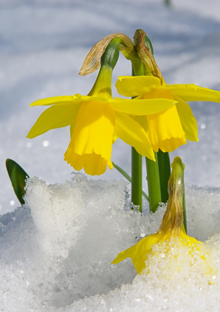Snow Falling on Seedlings

Photo: © 2009 Jupiterimages Corporation
Winter is to gardeners what summer is to ice-skaters: the off-season. But it's also a time to plan (maybe this year!) the perfect plot of land.
It's winter. In my part of the world, even with global warming, that still means five solid months of nothing blooming in the flower beds. Four months in which the most exhilarating of all forms of exercise—digging—is impossible because the ground is frozen as hard as a cast-iron urn. An entire season in which there is no shopping for groceries in the backyard or happily wandering the aisles of a good nursery.Winter is tough for gardeners in the Northeast, the Midwest, and the western high country to endure. Most of the gardeners I know spend their winters in a towering cosmic pique: It's so unfair, being kept from doing the thing we love best for months at a time, just because our piece of earth happens to be tilted away from the sun.
While you'll never catch me saying that I like winter, I do respect it. I even consider it necessary. First of all, winter does important things for nature. The freezing action improves the soil, lightening it up. Snow insulates plants that would otherwise never survive the low temperatures. The bitter cold itself keeps pests and diseases in check. Winter just cleans out the joint.
Winter does important things for the gardener, too—though it's not the cold that counts; it's the enforced hiatus. (Gardeners in places like Atlanta and Austin, who can happily plant right through January and February, experience their time-out in smoking-hot summers, when sticking anything in the ground is a form of gardening suicide.) Here's what a winter break does: It scours the mental landscape. Keeps us from getting jaded. Erases from memory the excesses and failures of the year before. Allows us to believe that next year, for sure, it's all going to work—there will be no weeds, no drought, no personal idiocy, no dead-as-doornails $29 plants.
Winter is part of what makes gardening so addictive—it's a dreamy season of absurd longing and unreasonable hope. Since we can't plant real plants, we gardeners tend to read plant catalogs obsessively, getting a weird vicarious boost from their lush photographs of greenery and blooms. To see is to want, so we throw around our credit cards freely—gosh, I have 500 lilies in my yard but none of those, and it's criminal not to grow gooseberries, right?—and order insane numbers of things for spring. With all these plants on the way, we make fantastical plans for the yard, unfettered by the limits of the space or our own capacity for labor.
By replacing reality with a blank canvas of frozen stubble onto which we can project our own visions of paradise, winter keeps us from becoming too practical. That's important, because gardening is not a practical pursuit. Sure, it will allow you to keep the yard neat or grow a nice salad for dinner, but these finite ends are not the reason gardeners work like fiends. They do it because they are chasing the very mystery and miracle of life, and their crocuses and lettuces and roses bring them closer to it.
Winter keeps the gardener reaching for that mystery, reaching for something higher, for another plane of beauty and fecundity. And since all those plants we order in fits of midwinter madness actually do show up in the spring, demanding to be stuck in the ground, the garden really does become more beautiful and fecund and mysterious (or at least more crowded) every year.
In gardening, it's the off-season that makes the game.



